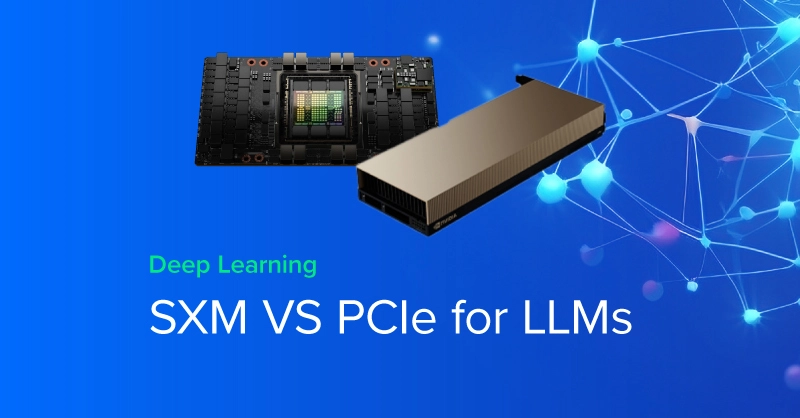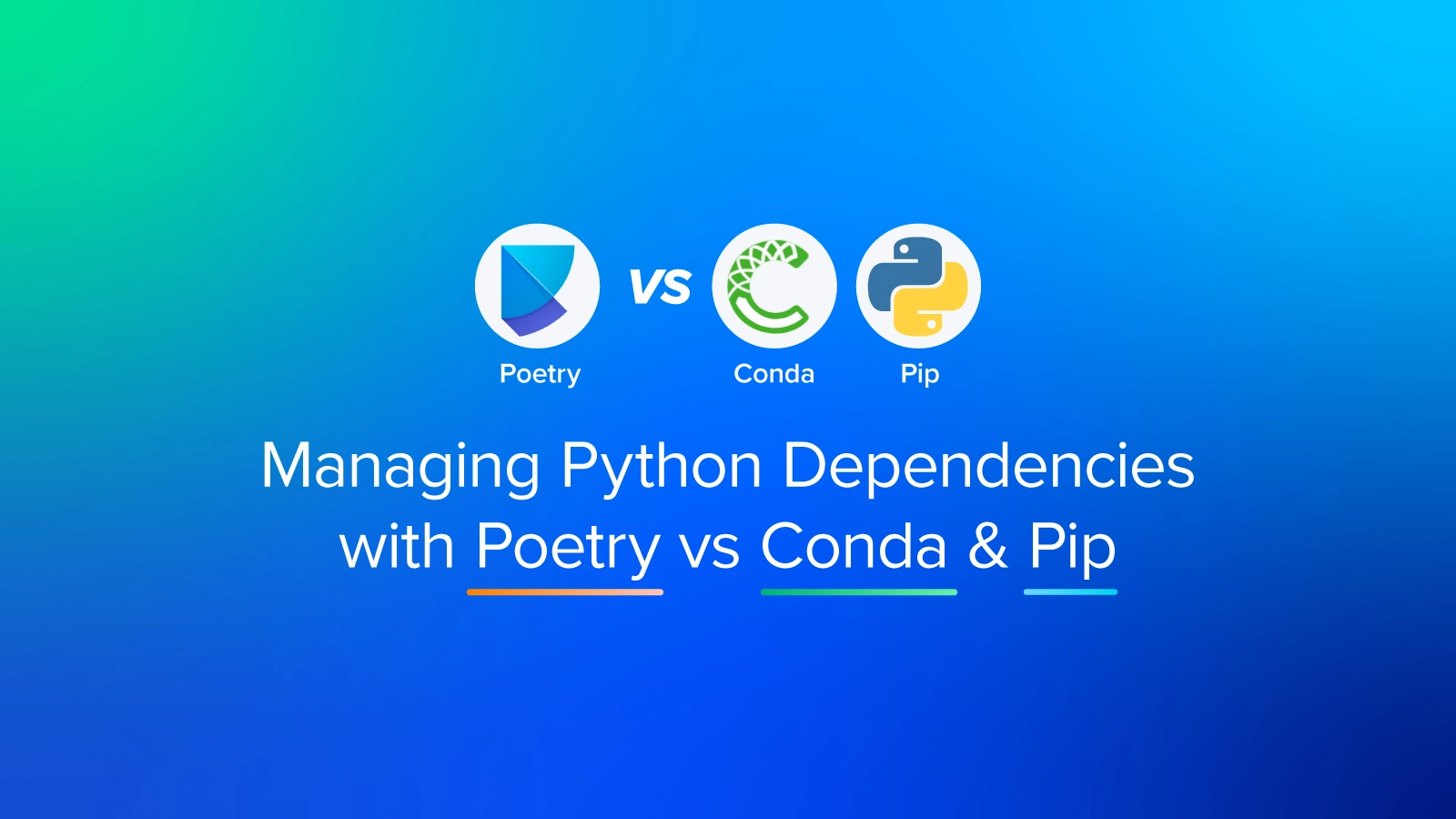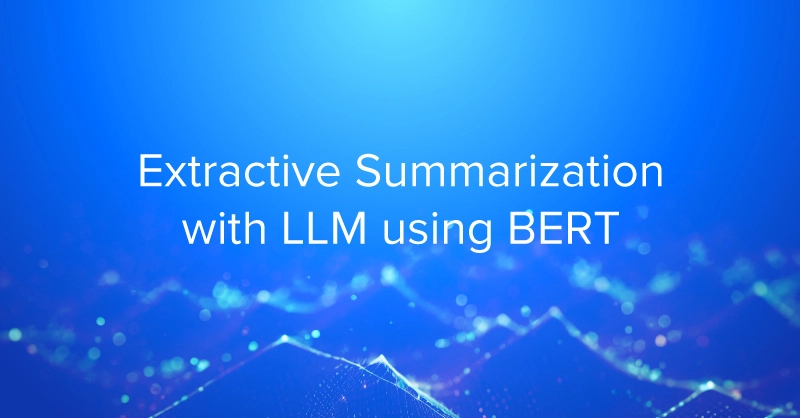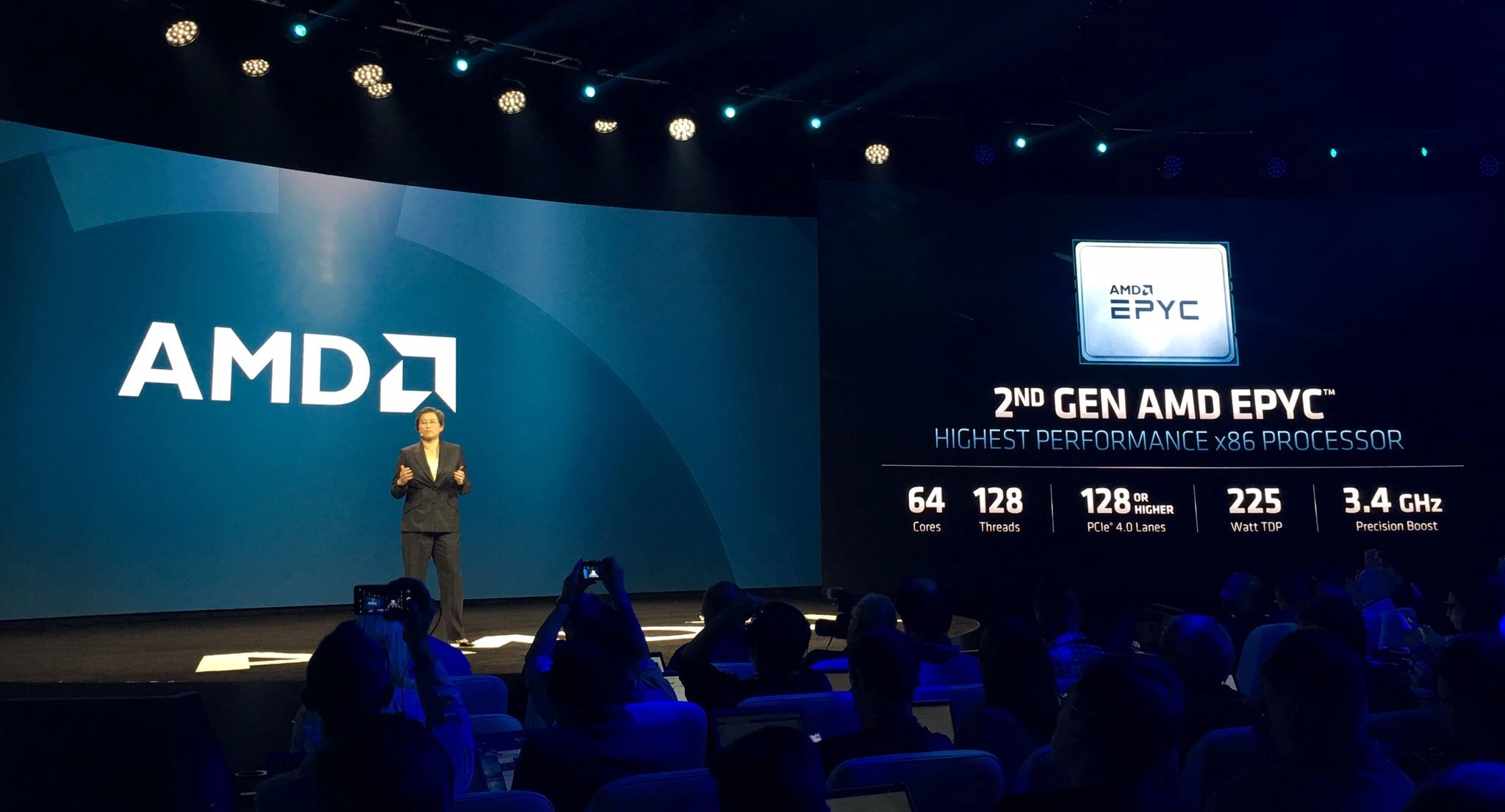
AMD EPYC Rome 7nm Processors Set a New Standard for CPU Performance
The long awaited 'AMD EPYC Rome' has finally arrived. Announced August 7th, 2019, AMD's New 7002 Series server processors have taken the compute world by storm. The 7002s feature up to 64 'Zen 2' cores per SoC, and deliver marked improvements on per-core server workloads over several Benchmarks. This includes: Floating Point Performance, JAVA Performance, Integer Performance, and HPC Workloads.
AMD EPYC Rome Benchmarks
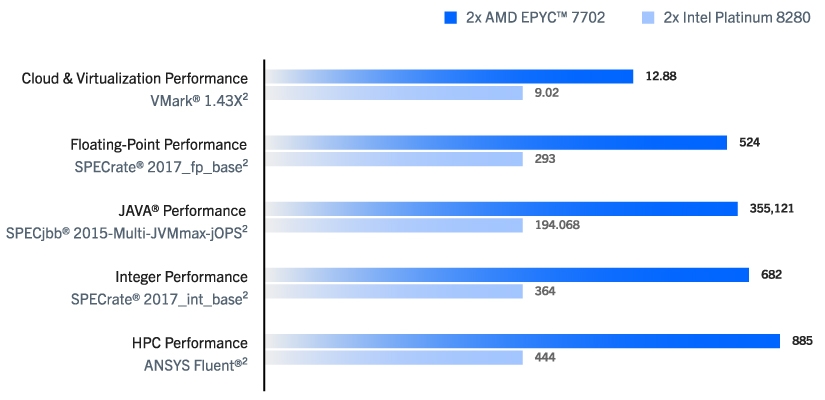
2) Cloud and Virtualization Performance is measured with VMmark® 3.1. Integer Performance is measured with SPECrate®2017_int_rate_base. Floating-Point Performance is measured with SPECrate®2017_fp_rate_base. JAVA® Performance is measured with SPECjbb®2015-MultiJVM max-jOPS, and finally, HPC Performance is measured with ANSYS FLUENT®

AMD Rome 7002 Series Specifications
| Model | OPN | Cores | Threads | Base Clock | Boost Clock | TDP |
| AMD EPYC 7742 | 100-0000000053 | 64 | 128 | 2.25 GHz | 3.40 GHz | 225W |
| AMD EPYC 7702 | 100-0000000038 | 64 | 128 | 2.00 GHz | 3.35 GHz | 200W |
| AMD EPYC 7702P | 100-000000047 | 64 | 128 | 2.00 GHz | 3.35 GHz | 200W |
| AMD EPYC 7642 | 100-000000074 | 48 | 96 | 2.30 GHz | 3.30 GHz | 225W |
| AMD EPYC 7552 | 100-0000000076 | 48 | 96 | 2.20 GHz | 3.30 GHz | 200W |
| AMD EPYC 7542 | 100-0000000075 | 32 | 64 | 2.90 GHz | 3.40 GHz | 225W |
| AMD EPYC 7502 | 100-0000000054 | 32 | 64 | 2.50 GHz | 3.35 GHz | 180W |
| AMD EPYC 7502P | 100-000000045 | 32 | 64 | 2.50 GHz | 3.35 GHz | 180W |
| AMD EPYC 7452 | 100-0000000057 | 32 | 64 | 2.35 GHz | 3.35 GHz | 155W |
| AMD EPYC 7402 | 100-0000000046 | 24 | 48 | 2.80 GHz | 3.35 GHz | 180W |
| AMD EPYC 7402P | 100-000000048 | 24 | 48 | 2.80 GHz | 3.35 GHz | 180W |
| AMD EPYC 7352 | 100-0000000077 | 24 | 48 | 2.30 GHz | 3.20 GHz | 155W |
| AMD EPYC 7302 | 100-0000000043 | 16 | 32 | 3.00 GHz | 3.30 GHz | 155W |
| AMD EPYC 7302P | 100-000000049 | 16 | 32 | 3.00 GHz | 3.30 GHz | 155W |
| AMD EPYC 7282 | 100-000000078 | 16 | 32 | 2.80 GHz | 3.20 GHz | 120W |
| AMD EPYC 7272 | 100-000000079 | 12 | 24 | 2.90 GHz | 3.20 GHz | 120W |
| AMD EPYC 7262 | 100-000000041 | 8 | 16 | 3.20 GHz | 3.40 GHz | 155W |
| AMD EPYC 7252 | 100-000000080 | 8 | 16 | 3.10 GHz | 3.20 GHz | 120W |
| AMD EPYC 7232P | 100-000000081 | 8 | 16 | 3.10 GHz | 3.20 GHz | 120W |
For more AMD EPYC CPU information, visit this page here!
AMD 7002 Series is First-to-market PCIe 4.0 readiness
The new 7002 series is also the first and only current x86-architecture server processor that supports PCIe 4.06. With this, PCIe 4.0 delivers double the I/O performance over PCIe 3.0. Effectively, you're allowed 128 lanes of I/O to double the network bandwidth that is the glue of modern HPC clusters. For application needs and in virtualized environments, this allows the ability to connect with higher speed to GPU accelerators, NVMe drives, and integrated disk controllers.
Best in Class Security, a Key Feature of AMD EPYC Rome Processors
Starting with the 1st Gen AMD EPYC Processors which pioneered a an architecture designed to help defend against side-channel attacks, encryption for main memory and virtual machine memory, and cryptographically help secure the boot process AMD's 2nd Gen AMD EPYC Processors bring increased depth and optimization to these features with growing support in the software ecosystem.
2nd Gen EPYC processors helps safeguard privacy and integrity by encrypting each virtual machine with one of up to 509 unique encryption keys known only to the processor. This Secure Encrypted Virtualization (SEV) protects confidentiality of your data even if a malicious virtual machine finds a way into a vm's memory. In addition to this, it also protects against a compromised hypervisor reaches into a guest vm.
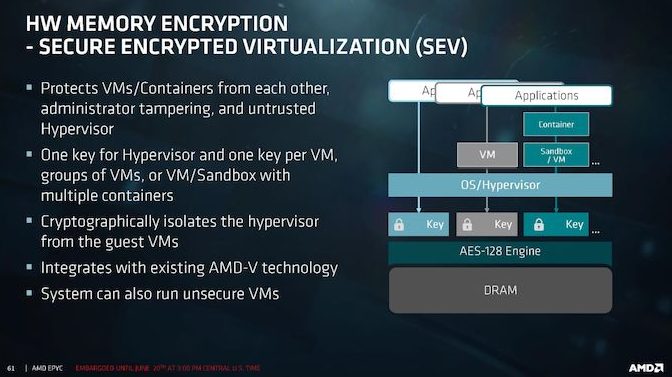
Image Source: AMD
AMD Features Infinity Architecture
AMD also highlighted the 'Infinity Architecture', a hybrid multi-die architecture that is central to the new EPYC 7002 Series processors. The Architecture now decouples two streams: 8 dies for the processor cores, and 1 I/O die that supports security and communication outside the processor.
7 Nanometer Silicon Process Takes Center Stage
Additionally, AMD is first to market a x86 processor based on 7 nanometer technology. With double the core density and optimizations that improve instructions per cycle, the result is 4x the Floating-Point performance of previous generation AMD EPYC.
The 7 nanometer process technology also touts it's energy efficiency. The 2nd Gen AMD EPYC can provide the same performance at half the power consumption.
Want to know more about these new processors? Have a question? Contact us today!

AMD EPYC Rome 7nm Officially Launches: New 7002 Series Benchmarks, Specs, Features & More
AMD EPYC Rome 7nm Processors Set a New Standard for CPU Performance
The long awaited 'AMD EPYC Rome' has finally arrived. Announced August 7th, 2019, AMD's New 7002 Series server processors have taken the compute world by storm. The 7002s feature up to 64 'Zen 2' cores per SoC, and deliver marked improvements on per-core server workloads over several Benchmarks. This includes: Floating Point Performance, JAVA Performance, Integer Performance, and HPC Workloads.
AMD EPYC Rome Benchmarks

2) Cloud and Virtualization Performance is measured with VMmark® 3.1. Integer Performance is measured with SPECrate®2017_int_rate_base. Floating-Point Performance is measured with SPECrate®2017_fp_rate_base. JAVA® Performance is measured with SPECjbb®2015-MultiJVM max-jOPS, and finally, HPC Performance is measured with ANSYS FLUENT®

AMD Rome 7002 Series Specifications
| Model | OPN | Cores | Threads | Base Clock | Boost Clock | TDP |
| AMD EPYC 7742 | 100-0000000053 | 64 | 128 | 2.25 GHz | 3.40 GHz | 225W |
| AMD EPYC 7702 | 100-0000000038 | 64 | 128 | 2.00 GHz | 3.35 GHz | 200W |
| AMD EPYC 7702P | 100-000000047 | 64 | 128 | 2.00 GHz | 3.35 GHz | 200W |
| AMD EPYC 7642 | 100-000000074 | 48 | 96 | 2.30 GHz | 3.30 GHz | 225W |
| AMD EPYC 7552 | 100-0000000076 | 48 | 96 | 2.20 GHz | 3.30 GHz | 200W |
| AMD EPYC 7542 | 100-0000000075 | 32 | 64 | 2.90 GHz | 3.40 GHz | 225W |
| AMD EPYC 7502 | 100-0000000054 | 32 | 64 | 2.50 GHz | 3.35 GHz | 180W |
| AMD EPYC 7502P | 100-000000045 | 32 | 64 | 2.50 GHz | 3.35 GHz | 180W |
| AMD EPYC 7452 | 100-0000000057 | 32 | 64 | 2.35 GHz | 3.35 GHz | 155W |
| AMD EPYC 7402 | 100-0000000046 | 24 | 48 | 2.80 GHz | 3.35 GHz | 180W |
| AMD EPYC 7402P | 100-000000048 | 24 | 48 | 2.80 GHz | 3.35 GHz | 180W |
| AMD EPYC 7352 | 100-0000000077 | 24 | 48 | 2.30 GHz | 3.20 GHz | 155W |
| AMD EPYC 7302 | 100-0000000043 | 16 | 32 | 3.00 GHz | 3.30 GHz | 155W |
| AMD EPYC 7302P | 100-000000049 | 16 | 32 | 3.00 GHz | 3.30 GHz | 155W |
| AMD EPYC 7282 | 100-000000078 | 16 | 32 | 2.80 GHz | 3.20 GHz | 120W |
| AMD EPYC 7272 | 100-000000079 | 12 | 24 | 2.90 GHz | 3.20 GHz | 120W |
| AMD EPYC 7262 | 100-000000041 | 8 | 16 | 3.20 GHz | 3.40 GHz | 155W |
| AMD EPYC 7252 | 100-000000080 | 8 | 16 | 3.10 GHz | 3.20 GHz | 120W |
| AMD EPYC 7232P | 100-000000081 | 8 | 16 | 3.10 GHz | 3.20 GHz | 120W |
For more AMD EPYC CPU information, visit this page here!
AMD 7002 Series is First-to-market PCIe 4.0 readiness
The new 7002 series is also the first and only current x86-architecture server processor that supports PCIe 4.06. With this, PCIe 4.0 delivers double the I/O performance over PCIe 3.0. Effectively, you're allowed 128 lanes of I/O to double the network bandwidth that is the glue of modern HPC clusters. For application needs and in virtualized environments, this allows the ability to connect with higher speed to GPU accelerators, NVMe drives, and integrated disk controllers.
Best in Class Security, a Key Feature of AMD EPYC Rome Processors
Starting with the 1st Gen AMD EPYC Processors which pioneered a an architecture designed to help defend against side-channel attacks, encryption for main memory and virtual machine memory, and cryptographically help secure the boot process AMD's 2nd Gen AMD EPYC Processors bring increased depth and optimization to these features with growing support in the software ecosystem.
2nd Gen EPYC processors helps safeguard privacy and integrity by encrypting each virtual machine with one of up to 509 unique encryption keys known only to the processor. This Secure Encrypted Virtualization (SEV) protects confidentiality of your data even if a malicious virtual machine finds a way into a vm's memory. In addition to this, it also protects against a compromised hypervisor reaches into a guest vm.

Image Source: AMD
AMD Features Infinity Architecture
AMD also highlighted the 'Infinity Architecture', a hybrid multi-die architecture that is central to the new EPYC 7002 Series processors. The Architecture now decouples two streams: 8 dies for the processor cores, and 1 I/O die that supports security and communication outside the processor.
7 Nanometer Silicon Process Takes Center Stage
Additionally, AMD is first to market a x86 processor based on 7 nanometer technology. With double the core density and optimizations that improve instructions per cycle, the result is 4x the Floating-Point performance of previous generation AMD EPYC.
The 7 nanometer process technology also touts it's energy efficiency. The 2nd Gen AMD EPYC can provide the same performance at half the power consumption.
Want to know more about these new processors? Have a question? Contact us today!

